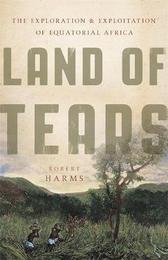
|
Land of Tears: The Exploration and Exploitation of Equatorial Africa
Hardback
Main Details
| Title |
Land of Tears: The Exploration and Exploitation of Equatorial Africa
|
| Authors and Contributors |
By (author) Robert Harms
|
| Physical Properties |
| Format:Hardback | | Pages:544 | | Dimensions(mm): Height 238,Width 154 |
|
| Category/Genre | African history
Economic history |
|---|
| ISBN/Barcode |
9780465028634
|
| Classifications | Dewey:967.031 |
|---|
| Audience | | General | | Tertiary Education (US: College) | | Professional & Vocational | |
|---|
| Illustrations |
11 Maps, 25 Illustrations, black & white
|
|
Publishing Details |
| Publisher |
Basic Books
|
| Imprint |
Basic Books
|
| Publication Date |
3 December 2019 |
| Publication Country |
United States
|
Description
In January 1885, the powers of Europe gathered in Berlin to set ground rules for dividing Africa and its lucrative natural resources among themselves. In the years that followed, they rapidly laid claim to nearly all of the continent. Africa's division and conquest might appear today to have been inevitable. But the outcome was far from certain. Drawing upon decades of research, esteemed historian Robert Harms shows how outsiders from Europe, America, and the Arab world competed for resources, money, fame, and power in the Congo rainforest. Reconstructing this chaotic process, Land of Tears provides a comprehensive depiction of how invaders into the Congo basin transformed the region in just a few decades from terra incognita to the most brutally exploited region of Africa. For many centuries, the peoples of the Congo rainforest kept the disruptive forces of the global economy at arm's length, shielded on the west by the cataracts of the lower Congo River and on the east by the lakes and mountains of the Albertine rift. During the second half of the nineteenth century-in a process known as the "Scramble for Africa"-traders, explorers, and empire builders breached the barriers and moved rapidly into the Congo basin, first from the east and then from the west. By the 1880s, merchants of ivory, slaves, and rubber, operating under the authority of the Sultan of Zanzibar, the King of Belgium, and the government of France, were methodically stripping the rainforest of its rapidly-depleting natural bounty in order to satisfy growing demand in Europe and the United States. Central to this process were three men: Henry Morton Stanley, a Welsh explorer working on behalf of King Leopold of Belgium; Pierre savourgnan de Brazza, an Italian from the Papal States who carved out an empire for France; and Hamid bin Muhammad (known as Tippu Tip), a man of mixed African and Arab descent who built a vast trading empire, first as a client of the Sultan of Zanzibar and later in the employ of Leopold. These men were representative of the interests vying for resources in the region, and the drama of their lives was contoured by the devastation their exploits visited upon the Congo. Swivelling between events in Africa and those in Europe and the United States, Land of Tears reveals the complex ways worldwide networks of trade, travel, and communication reshaped and ruined Equatorial Africa.Offering vivid descriptions of African ivory and slave caravans, rubber hunters, and local governance in Africa and piano key factories, humanitarian conferences, and diplomatic meetings in Europe and America, Harms demonstrates how the Congo became fully and fatefully enmeshed within our global world.
Author Biography
Robert Harms is Henry J. Heinz Professor of History and African Studies at Yale University. He is the author of several books on African history, including The Diligent, winner of the Mark Lynton History Prize, the Frederick Douglass Prize, and the J. Russell Major Prize. He lives in Guilford, Connecticut.
Reviews"Land of Tears confirms that Robert Harms is African history's most thrilling narrator. The book is compulsively readable and dramatic history, as well as a critical intervention in the historiography of the Congo River basin at the turn of the twentieth century. In vivid prose, Harms demonstrates what the onset of European rule in Equatorial Africa meant then, and what it still means in our own calamitous era. He reads new archives in exciting ways and teases novel interpretations from classic texts. Land of Tears is engrossing, disturbing, revelatory, infuriating, and never, ever boring. It is history as it should be written and a worthy addition to an estimable scholar's oeuvre."--Daniel Magaziner, Yale University "Land of Tears is a brilliant and beautifully written book on a crucial moment in the colonial history of Central Africa. Robert Harms reveals the global and local contexts of the complex transformations of African societies in the last decades of the nineteenth century, with a special focus on the rainforest ecosystem and the strong local African resistance. An erudite, balanced, and timely book, and an engaging read."--Frits Andersen, Aarhus University "Land of Tears provides a vivid account of the period before the 'Scramble for Africa, ' when European explorers frantically created beachheads for imperial expansion and the carving up of equatorial Africa. In this major contribution, Robert Harms reveals the intertwined interests of global trading networks that plundered and wreaked havoc in the Congo Basin."--Ch. Didier Gondola, author of The History ofthe Congo "In this unwaveringly detailed account of the colonization of central Africa, Robert Harms draws on four decades of scholarly expertise to write a history at once regional and truly global. A tale of soldiers, slave-traders, captives and kings, of principles betrayed and societies destroyed-for anyone interested in capitalism and empire, this book is as devastating as it is important."--Maya Jasanoff, author of The Dawn Watch: Joseph Conrad in a Global World
|